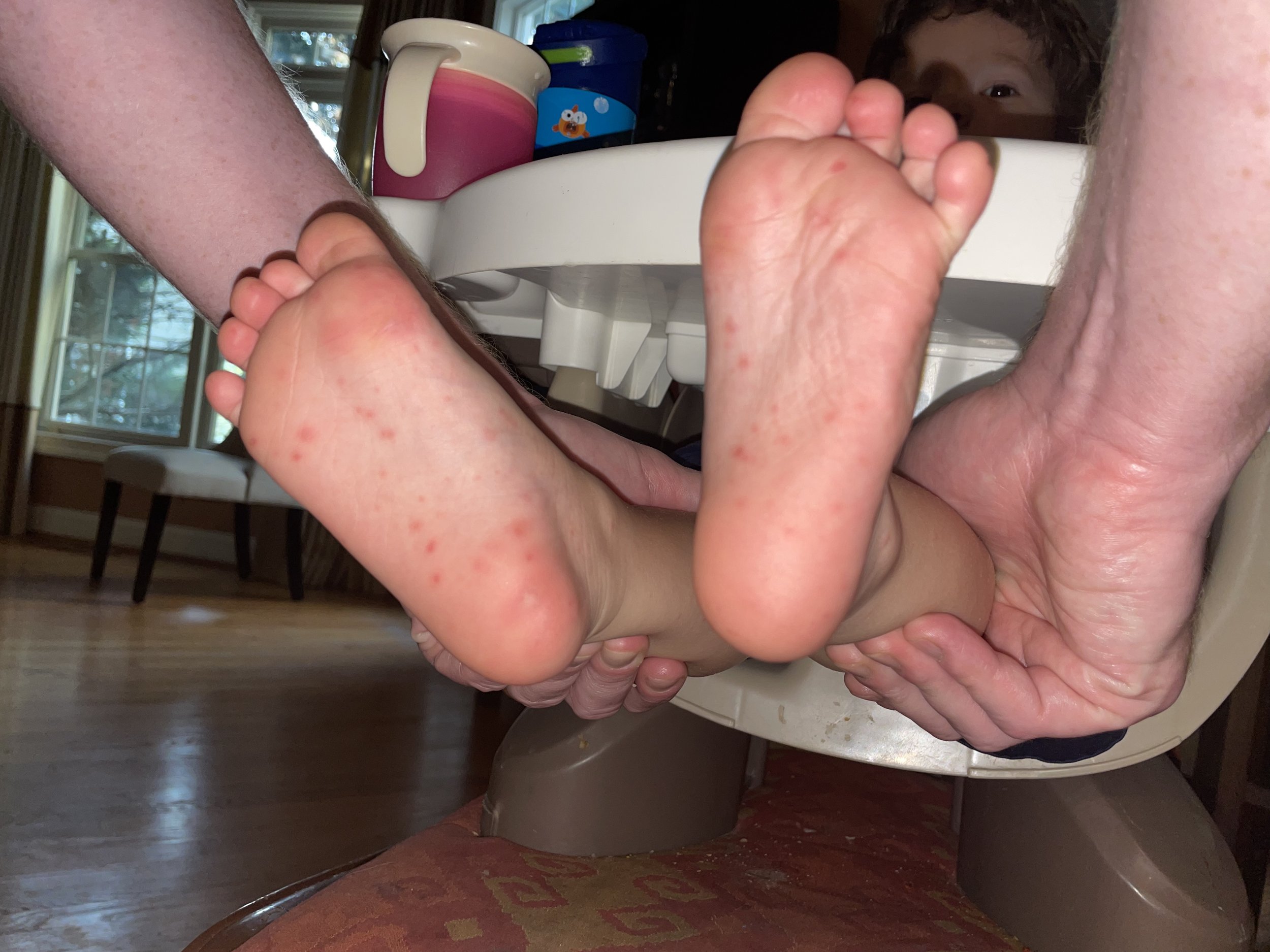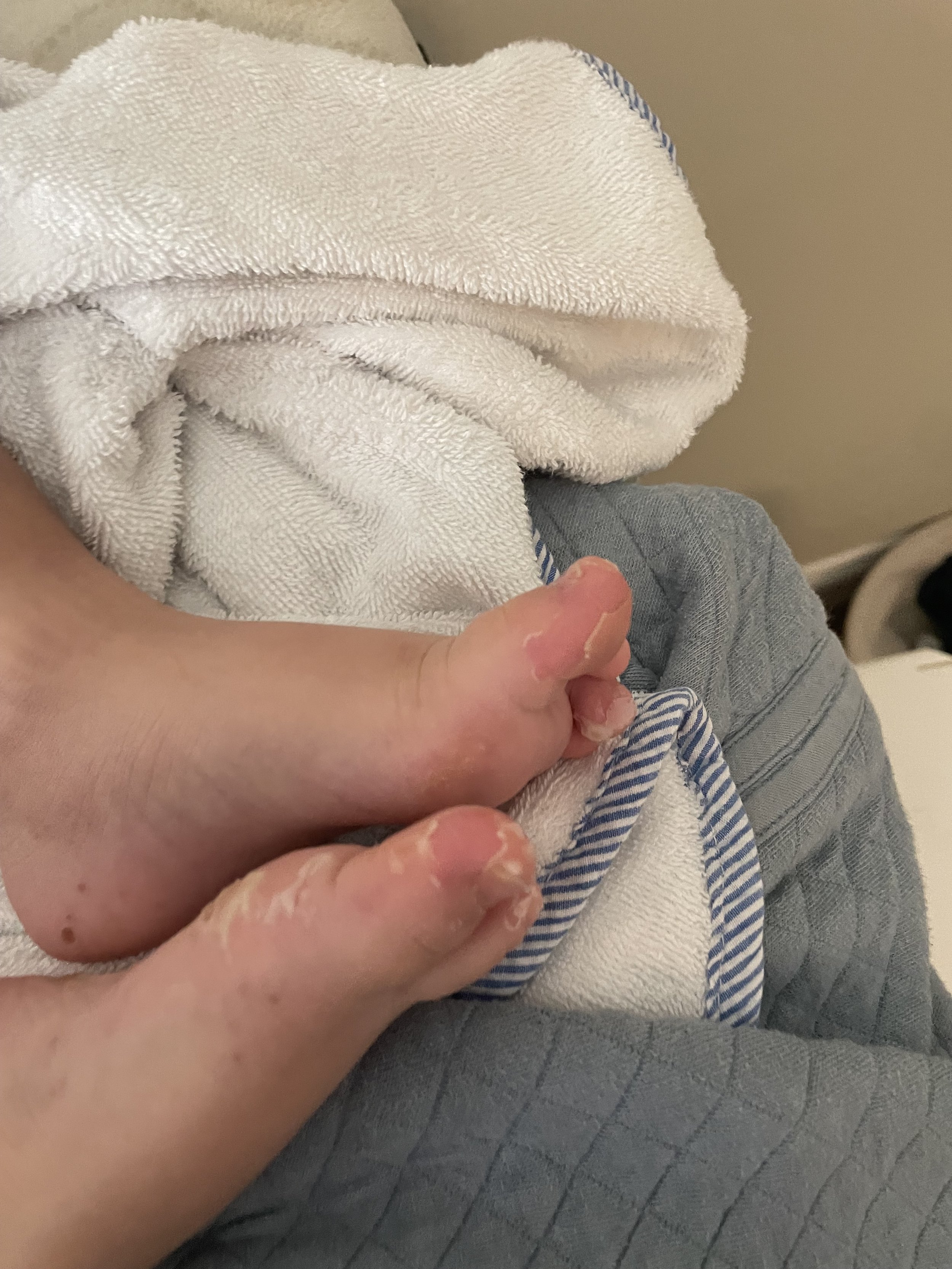Hand, Foot & Mouth
You pick up your toddler and you see a rash on their hand or around their mouth. Then you hear that Hand/Foot/ Mouth is going around daycare.
Here is what you need to know!
What is it?
Hand, Foot and Mouth Disease is an infection caused by a group of Enteroviruses, most commonly Coxsackieviruses (there are multiple strains, although A16 is the most common). Herpangina is closely related to HFMD except it involves just the mouth sores (without the body rash).
Certain strains can cause more extensive and severe symptoms
How do you know?
Symptoms that are typical include:
(c) The Pediatrician Mom, LLC
Fever (not everyone has this)
Fussiness/pain
Rash anywhere on body although classically appears on hands, feet, in diaper area and in mouth. It usually begins within 0-2 days after fever/illness begins.
Red bumps —> become sores some of which are filled with fluid —> some will open and crust
Mouth sores, which are usually on the inner cheeks, tongue, gums or back of the mouth.
Some kids will have abdominal pain, vomiting and diarrhea.
The Pediatrician Mom Tip: With certain strains, expect nail and hand/foot changes (see below) about 2-6 weeks after the illness. No need to worry.
This looks gross, but it is generally painless, and the peeling skin/nails will grow back within a few weeks. Cut peeling skin back carefully with nail scissors.
Transmission & Incubation:
Occurs via:
contact with respiratory droplets (sharing cups and utensils, close contact such as kissing, sharing toys)
fecal-oral shedding (wash your hand after diaper changes!)
contact with the fluid that oozes from sores
Incubation period in most people is 3-5 days, but can range from 2-7 days.
The Pediatrician Mom Tip: Virus can be shed in the stool for more than 6 weeks.
Timeline & Treatment:
Rash can last up to 7-10 days but does not need any treatment, just supportive care if it is bothering the child.
Because this is a viral syndrome, antibiotics will not help.
Management focuses on keeping children comfortable and hydrated.
What can you do?
Mouth pain:
Acetaminophen or Ibuprofen as needed (offer by syringe if needed).
Soft + cold foods are better; salty, spicy or acidic foods can worsen pain.
Some doctors recommend magic mouthwash but there are variable recipes and recommendations. If your child is in severe pain, this is a good option to discuss with your doctor.
Magic mouthwash: This is a remedy sometimes recommended for mouth sores, but there is a lot of variability in terms of recipe and specifics. Talk to your pediatrician about whether it is appropriate for your child before trying it.
One recipe we sometimes use a liquid antacid (like Maalox or Mylanta) on a Q tip, and dab onto lesions in the mouth 3-4 times per day for children under age 5; for children over age 6, who can reliably spit - they can them swish a teaspoon (approx 5ml) around in their mouth and then spit out. Never give this to your child without consulting your doctor first.
Hydration:
Pedialyte, popsicles, smoothies, cold jello
Watch for signs of dehydration; see this post for more.
Rash:
Do not try to open up the blisters
No need to do anything unless uncomfortable; many children do not seem bothered, although adults report discomfort.
IF there is pain you can try:
cool compresses for 20 minutes at a time
topical hydrocortisone
calamine lotion
diaper ointment (the zinc oxide heals broken skin nicely)
The Pediatrician Mom Tip: for pain on the soles of the feet, rolling the feet on a frozen water bottle can be especially soothing (or using an ice pack)
For diaper rash, continue thick barrier protection with zinc oxide based diaper ointment (note: this can be used on other areas of the body too — studies show that zinc oxide functions well to help heal and protect skin).
What about baking soda paste?
I wasn’t able to find great evidence for this, and baking soda can be a skin irritant, so I would avoid putting it on skin that is already irritated.
Fever:
Acetaminophen or ibuprofen as needed. Focus on comfort. See the guides section of this website for a free download with dosing info.
When to call the pediatrician
This is not a comprehensive list. In general, always err on the side of calling your pediatrician if you have any concerns about your child. There is a lot to be said for a parent’s gut instinct, and I promise: your pediatrician would rather you called!
If your child is not improving within a few days, or if they seem to be getting worse, call your pediatrician. Other concerning symptoms include:
Severe pain or difficulty being consoled
Dehydration — see my prior posts for signs to look for. In some children, the mouth sores can be so painful they refuse to drink - and may need IV fluids.
Fever is persistent beyond 3-5 days
Anything else tickling your spidey sense!!
FAQs
Can adults get it?
Uhh yes.
How do I prevent spread?
Good hand washing, especially after diaper changes. Use soap and water and wash for 20 seconds each time. Keep in mind that virus can be shed in the stool for more than 6 weeks.
Disinfect frequently touched household surfaces at least 1-2 times per day (doorknobs, counters, etc).
For toys: either run them through the sanicycle in your dishwasher, or if they are more delicate, wash with soap and water or a cleaning product that contains bleach.
Does my child need to stay home from school?
Yes, particularly if the rash is continuing to spread or there are open or weeping sores. Keep them home until they are feeling better (able to stay hydrated, acting more like themselves), fever free for >24h, and all sores have scabbed over.
The Pediatrician Mom Tip:
Children with eczema often have more severe outbreaks of HFMD and are at higher risk for bacterial superinfection.






